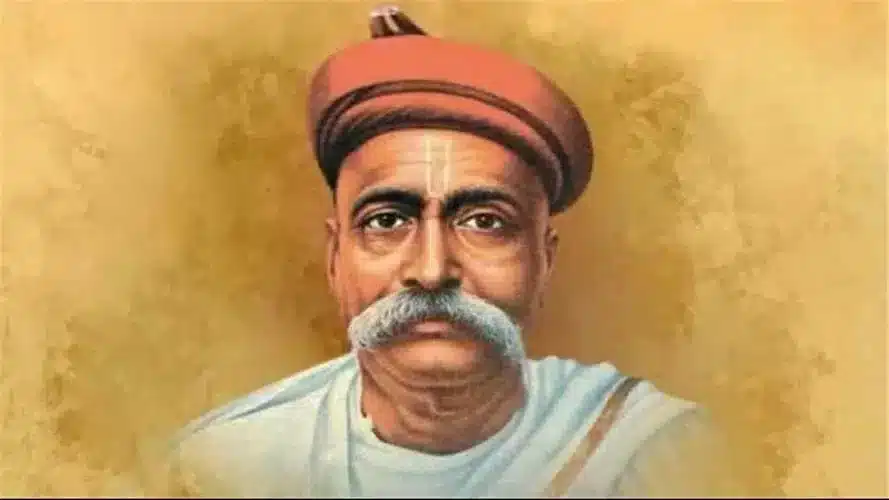Bal Gangadhar Tilak: The Lion of India’s Freedom Struggle

Bal Gangadhar Tilak (23 July 1856 – 1 August 1920) was a scholar, mathematician, philosopher, and radical nationalist who laid the foundation of India’s independence. He founded the ‘Indian Home Rule League’ in the year 1914 and was its president in 1916 signing the Lucknow Pact with Muhammad Ali Jinnah. He started the work of awakening the political consciousness of the people through two weekly newspapers, Kesari in Marathi and The Maratha in English.
Tilak’s views were a bit more extreme for the moderate party like Indian National Congress. His prominent slogan was “Swaraj is our birthright and I will have it.” Taking a resolution to use his free time for some good work, he devoted it to the reading of his favourite books, the Bhagavad Gita and Rigveda.
Life & Education
Born in Ratnagiri district to a Hindu Chitpavan Brahmin family on 23 July 1856. Gangadhar Tilak, his father, was a schoolteacher and a Sanskrit scholar who died when Tilak was sixteen.
He got his Bachelor of Arts in Mathematics from Deccan College of Pune in 1877. He left his M.A. course of study midway to join the L.L.B course instead, and in 1879 he obtained his L.L.B degree from Government Law College. Tilak started teaching mathematics at a private school in Pune after graduating. After his ideological differences with his colleagues in the new school, he resigned and became a journalist.
Political career
In 1890, Tilak joined the Indian National Congress. He opposed its moderate attitude, especially on self-government. During that time, he was an eminent radical. During the Swadeshi movement of 1905 – 1907, Indian National Congress split into moderates and extremists.
During the bubonic plague in 1896, the British imposed strict curbs that led to resentment among the Indian community. Tilak took up this issue in his newspaper (Kesari was written in Marathi, and “Maratha” was written in English). He quoted the Hindu scripture, the Bhagavad Gita, the Bhagavad Gita, to say that no blame could be attached to anyone who killed an oppressor without any thought of reward.
The British Indian Government tried Tilak for sedition charges three times during his lifetime — in 1897, 1909, and 1916. For preaching dissension against the Raj, Tilak spent 18 months in prison. Again in 1909, he was charged with sedition and intensifying racial animosity between Indians and the British. Another sedition charge led to a six-year prison term in Mandalay, Burma.
He was the most famous Indian politician before Gandhi. As opposed to his fellow Maharashtrian, Gokhale, Tilak was a social conservative. Over the course of his life, he was imprisoned on a number of occasions, including a long time at Mandalay. He was once called “the father of Indian unrest” by British author Sir Valentine Chirol.
Tilak and Swami Vivekananda
There was a lot of mutual respect and esteem between Tilak and Swami Vivekananda. They met by accident while traveling by train in 1892.
In the Kesari, Tilak paid tribute to Vivekananda when he died at a young age. He said:
No Hindu, who, has the interests of Hinduism at his heart, could help feeling grieved over Vivekananda’s samadhi. Vivekananda, in short, had taken the work of keeping the banner of Advaita philosophy forever flying among all the nations of the world and made them realize the true greatness of Hindu religion and of the Hindu people. He had hoped that he would crown his achievement with the fulfilment of this task by virtue of his learning, eloquence, enthusiasm and sincerity, just as he had laid a secure foundation for it; but with Swami’s samadhi, these hopes have gone. Thousands of years ago, another saint, Shankaracharya, who, showed to the world the glory and greatness of Hinduism. At the fag of the 19th century, the second Shankaracharya is Vivekananda, who, showed to the world the glory of Hinduism. His work has yet to be completed. We have lost our glory, our independence, everything.
Tilak died on 1 August 1920, in Mumbai, India. He was 64.
Interesting facts about Bal Gangadhar Tilak
Lala Lajpat Rai of Punjab, Bal Gangadhar Tilak of Maharashtra, and Bipin Chandra Pal of Bengal, the triumvirate were popularly known as Lal Bal Pal, changed the political discourse of the Indian independence movement. Here are a few interesting facts about the legend:
- Because of Tilak, Ganesh Chaturthi is such a huge celebration now. It was his idea to have several days of processions, music, and food to strengthen Indian unity.
- In addition, Tilak started a Shri Shivaji Fund Committee for celebrating the birth anniversary of Chhatrapati Shivaji Maharaj, the founder of the Maratha empire.
Quote of Bal Gangadhar Tilak
Here are a few inspiring quotes by the leader:
- The problem is not the lack of resources or capability, but the lack of will
- If God is put up with untouchability, I will not call him God
- Swaraj is my birthright, and I shall have it!
Legacy of Bal Gangadhar Tilak
- In 1903, Bal Gangadhar Tilak wrote the book “The Arctic Home in the Vedas”
- In prison at Mandalay, Tilak wrote the book “Shrimadh Bhagavad Gita Rahasya,” an analysis of “Karma Yoga”.
- A portrait of Tilak was put in Parliament House’s Central Hall on 28 July 1956.
- There’s a theatre in Pune dedicated to him called Tilak Smarak Ranga Mandir.
- The Government of India released a coin to commemorate Tilak’s 150th birthday.
- Many Indian films have been made about him, including Lokmanya Bal Gangadhar Tilak (1951) and Lokmanya Tilak (1957), both by Vishram Bedekar.
Observer Voice is the one stop site for National, International news, Sports, Editor’s Choice, Art/culture contents, Quotes and much more. We also cover historical contents. Historical contents includes World History, Indian History, and what happened today. The website also covers Entertainment across the India and World.

